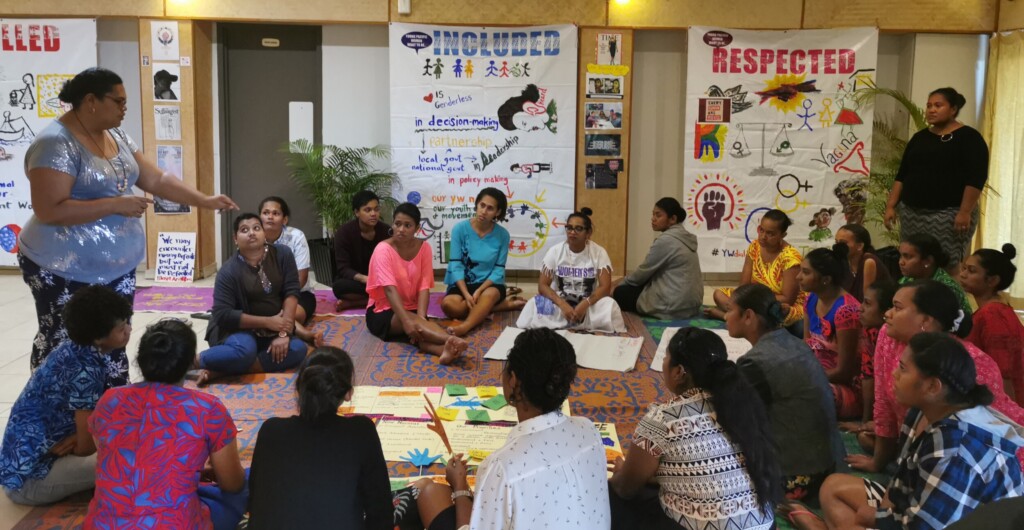COVID-19 support: Understanding the lived realities of young women and girls
September 18, 2020
By Neehal Khatri

National Young Women’s Learning Exchange. PC:FWRM
As the economic and social uncertainties arising from the COVID-19 pandemic continue, young women and girls in Fiji face additional challenges as they navigate their personal and professional/academic lives in the new normal. Understanding their lived realities during this period is critical to ensure they receive appropriate support.
Earlier this year, the Fiji Women’s Rights Movement (FWRM) conducted a small-scale rapid assessment on the impact of COVID-19 on young women and girls in Fiji. The assessment, conducted via an online survey and phone interviews, focused on young women and girls’ coping strategies as well as their experiences at home and in their professional/academic lives.
The rapid assessment report revealed that the majority of the young women and girls surveyed were expected to do more housework than their male family members during the lockdown period. The report also highlighted that about two thirds of the young women surveyed who were studying at universities faced challenges while juggling online studies and unpaid care work during the lockdown.
The report recommended a large-scale, representative study on the impacts of COVID-19 on young women and girls in Fiji. It also highlighted that the Government should strengthen media advocacy and visibility on challenging gender roles in homes during the COVID-19 period.
Building upon the preliminary findings from the rapid assessment exercise, FWRM launched several initiatives to provide avenues for young women and girls to exchange COVID-19 experiences and learn from each other. This work is supported by the International Women’s Development Agency (IWDA) and the Fiji Women’s Fund under FWRM’s Young Feminist Rise (YFemRise) Program. The two-year program aims to use transformative change principles to build agency and the capacities of a generation of diverse young feminists, advocates and leaders in their own right.
Between April and July, FWRM conducted a series of face-to-face dialogues for small groups of young women to share their experiences and coping strategies during the COVID-19 period. The sessions, held in the northern, western and central divisions, were facilitated by FWRM’s Intergenerational Women in Leadership Team.
This culminated in a three-day national learning exchange event in Suva, focused on reflecting and thinking beyond COVID-19. The workshop provided an avenue for 20 young women to learn and exchange advocacy strategies of coping through the pandemic and ways to think beyond in times of crisis. The participants included students from the Fiji National University (FNU) and the Fiji Association of the Deaf who were part of the divisional dialogues held earlier. The event was organised by FWRM and FNU.
According to FWRM Executive Director Nalini Singh, the pandemic has exacerbated the discrimination faced by young women and girls.
“Young women and girls face multiple forms of discrimination against their gender, age, location and abilities thus spaces such as these are crucial to sharing their perspectives and addressing the threats to their safety and security,” she said.
In addition to the face-to-face sessions, FWRM also hosted a webinar series with the theme ‘Ask, Listen and Act’, which brought together an intergenerational panel of female speakers who shared their experiences and reflections on how COVID-19 had impacted their lives. The topics discussed ranged from physical and mental health to education and economic livelihoods.
According to Alchana Shivani, a university student who participated as a panelist, the webinar series provided a good platform to hear firsthand about the challenges that fellow young women were facing, as well as ways in which initiatives in response to the crisis could be put in place. Each webinar included sign language interpreters to increase accessibility and the sessions were streamed live on FWRM’s Facebook page.
“There are exciting initiatives in the works that we’re looking forward to as we build on this first experience. Working with young students is important and FWRM will continue to engage with tertiary students,” Ms Singh said.
As the COVID-19 crisis continues to unfold, it is crucial that the various state and non-state actors involved in response work take into account the unique and additional challenges experienced by young women and girls.
About FWRM
FWRM is a Suva-based multi-ethnic and multicultural non-governmental organisation committed to removing discrimination against women through institutional reform and attitudinal change. FWRM’s four major pillar of work are: democratisation, institutional, structural and policy transformation, intergenerational leadership and organisational strengthening.
Recent Whats New
WFF Visit to “Rise Beyond the Reef”
December 12 2023
LifeBread Confident Woman Program Graduation
December 12 2023
